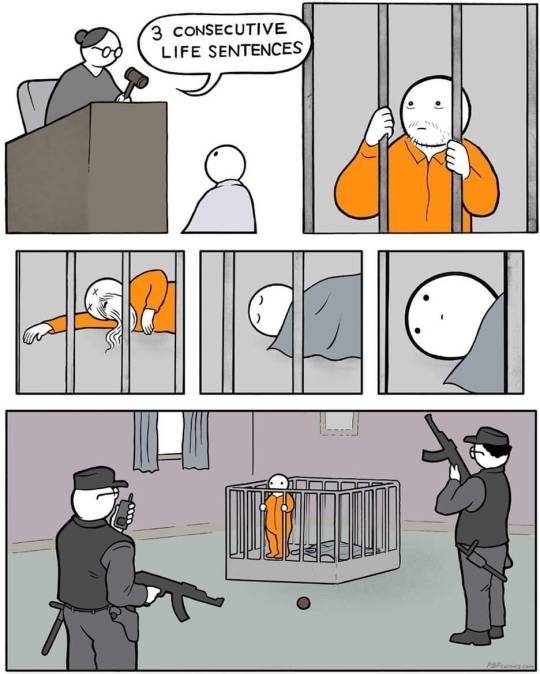#Prison
Text

The prison is not outside, but inside each of us. Perhaps we simply don't know how to live without it.
-- Olga Tokarczuk
(Warszawa, Poland)
#prison#inside#freedom#olga tokarczuk#travel photography#warsaw#warszawa#poland#window#view#book#bookblr#photography#quote#distance
212 notes
·
View notes
Text
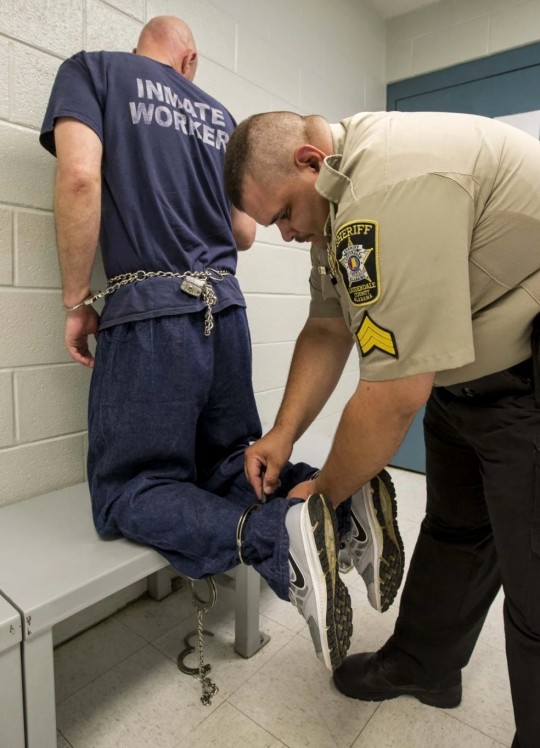
#convict#prisoner#locked up#jail#prison#inmate#behind bars#prison uniform#shackled prisoner#handcuffed inmate#prison blues
25 notes
·
View notes
Text
There Was Just Something About This Joke I Found Simply Delightful
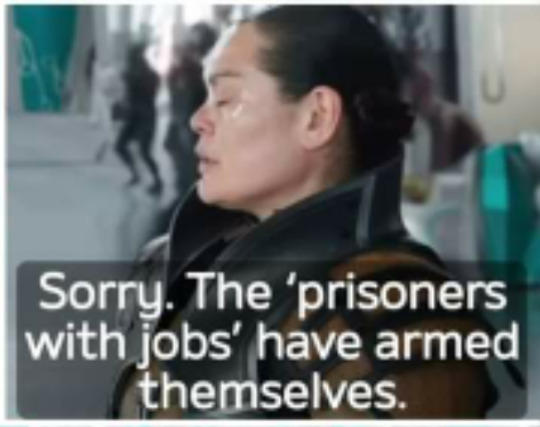
#revolt#revolution#slavery in fiction#tw marvel#marvel#joke#meme#funny#haha#funny post#funny shit#funny memes#lol#jokes#technically a joke#got the beat#and everything#ooh ooh ooh#i know#its that its real#prisoner#inmate#jail#prison#Real Life#USA#this is america#USAuthoritarianism#just a little guy#tehehe
20 notes
·
View notes
Text
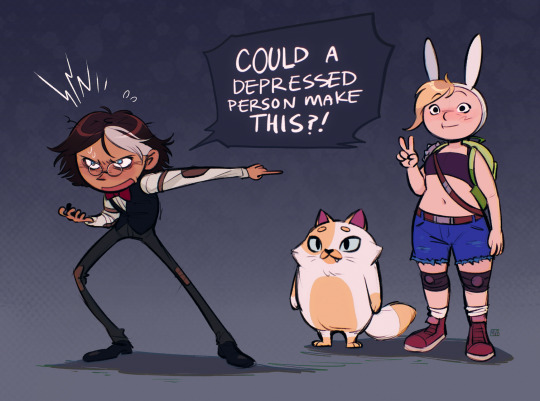
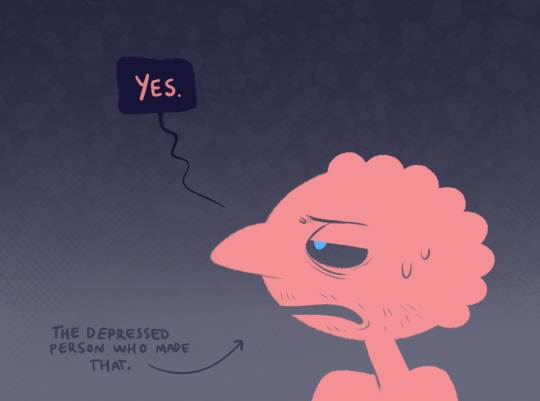
My sister and I have been keeping up with Fiona and Cake and loving it 🤧
Prismo, you sad sad goofball.
#art#digital#fanart#doodle#sketch#drawing#fan#my art#fan art#prison#simon petrikov#fiona and cake#Fionna and cake#fionna and cake show#Fionna and cake fanart#Simon petrikov fanart#Fionna and cake spoilers
34K notes
·
View notes
Text

As soon as it looks like Trump is headed to jail, Fox News suddenly discovers American prisons can, in fact, have inhumane conditions.
23K notes
·
View notes
Text
CANT STOP THINKING ABOUT INMATE TOJI AND CUTE LITTLE Y/N WHOS SO NAIVE TO BIG BAD TOJI
CW: Slight smut (mentions of his pp🤭)
☆☆☆
thinking about Prison toji who you met when your college has you do a little project in your criminal psychology class. The project was make a penpal get to know them ask why they are in prision, what their lives before was like, do they regret what they did etc. basic questions of course all you had to do was get the most information out of the penpal about their personal lives as you could.
Prison Toji who only signed up for the program because it was part of his latest court order saying he ‘needed more understanding’ so a penpal would give him a friend while they stay safe😭 he ofc hated the idea and thought it was the dumbest shit ever. until he got his first letter, from you (duh).
Prison toji who got mail for the first time and it was a little white envelope with a cute little sticker sealing it. He deadpanned *is my penpal an idiot these letters are for a prison not a daycare* he silently judges examining every detail as he opened the letter. i read the letter taking in every little personal detail you shared with him, your cute little name, how you loved your cat, how you’re new to the city only just moving for school, of course the boring questions for him as well. But at the very end of the letter he noticed an extra little note.
Ps. i left a few photos of myself along with some of my cat! i think it’s only fair since i got to see your photo on the website
Prison toji who grabs the envelope he previously had thrown to the side and pulls out 3 polaroids. One of you and probably your cat you’re dragging it into the photo with a big grin on your face. the second is a photo of your face a soft smile on your lips meant for whoever took the photo but Toji couldn’t help but wonder if that little smile was for him. Until he pulls out the third photo it’s a full view of you, you’re out in the city dressed all out, and Toji couldn’t help but know you chose that photo just for him.
Prison Toji who can’t wait to finally get some alone time so he can truly appreciate your pretty photos. And immediately goes to write you back answering all your cute little questions. Telling you where he lived before, how he ended up there, telling you what he did for work before (Surprise he sold drugs😍), telling you what he does to occupy his time here (he works out he just wanted an excuse to tell you how strong he is), and he asks you some questions.
Prison Toji who has been relentlessly flirting with since you started writing to him, asking if you had a boyfriend, how your school was going, why you moved to the city, how a cute lil thing like you is still single. You had been writing each other for a few weeks now which is a lot less than you think when you know how long mail takes. But your letters to each other are long. answering every little thing each other asks, learning about one another more and more. You had really connected so you finally ask him the big question he read the words as clear as day.
~Do you think i could come pay you a visit? ~
Prison Toji who had to immediately write back answering the most important question first.
~ And doll, you can come visit me anytime id love to finally meet you and see your pretty face in person~
he wanted to be nonchalant.
Prison Toji who was sitting in bed looking at your photos when he was called
“Zenin, you’ve got a visitor. away from the door.”
Prison Toji silently followed standing on the other side of the cell while the guard came in to handcuff him and bring him to the visiting area. Once he was in the room his cuffs connecting him to the table he waited. until he heard the door open again. He felt his cock twitch in his pants as he saw the guard guide you in. You were wide eyed taking in the new environment until they landed on him.
Prison Toji was large, you knew he was tall and muscular thanks to his letters and photo but nothing could have prepared you for the real deal. Eyes widening even more when you fully take him in. seated At the grey metal table his hands on the table as the guard had told him to. his hair poking at his eyes which were staring drinking you in. his lip in a smirk helping you notice the scar on it which you couldn’t really see from the grainy prison photos. His shirt stretched against his muscles showing off a few tattoos hidden along his skin. the view making you squeeze your thighs together to release some of the pressure building.
Prison Toji who took in as much of you as he could as he watched you shuffle into your seat across from him, enjoying how you squirmed slightly within his gaze, his smirk growing into an almost full smile.
“hey doll it’s good to finally meet you.”
#toji fushiguro#toji zenin#toji x reader#jjk#jjk toji#toji smut#toji x you#jujutsu kaisen toji#prison#prison toji#inmate#inmate toji#pen pals#jail#jail toji#toji x y/n#jujutsu toji#feral#i need him#I LOVE TERRIBLE MEN#toji headcanons#smutish
13K notes
·
View notes
Text

Link to tweet
Link to article
2K notes
·
View notes
Text
Prison-tech company bribed jails to ban in-person visits
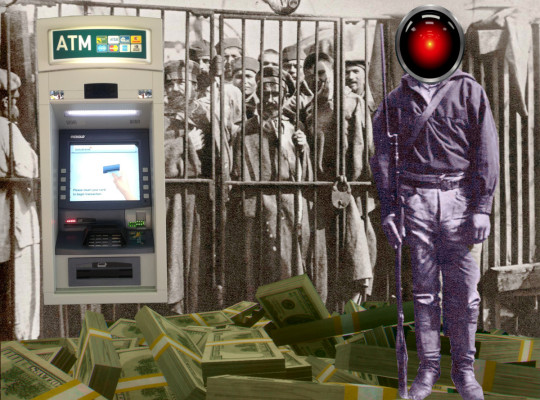
I'm on tour with my new, nationally bestselling novel The Bezzle! Catch me in BOSTON with Randall "XKCD" Munroe (Apr 11), then PROVIDENCE (Apr 12), and beyond!

Beware of geeks bearing gifts. When prison-tech companies started offering "free" tablets to America's vast army of prisoners, it set off alarm-bells for prison reform advocates – but not for the law-enforcement agencies that manage the great American carceral enterprise.
The pitch from these prison-tech companies was that they could cut the costs of locking people up while making jails and prisons safer. Hell, they'd even make life better for prisoners. And they'd do it for free!
These prison tablets would give every prisoner their own phone and their own video-conferencing terminal. They'd supply email, of course, and all the world's books, music, movies and games. Prisoners could maintain connections with the outside world, from family to continuing education. Sounds too good to be true, huh?
Here's the catch: all of these services are blisteringly expensive. Prisoners are accustomed to being gouged on phone calls – for years, prisons have done deals with private telcos that charge a fortune for prisoners' calls and split the take with prison administrators – but even by those standards, the calls you make on a tablet are still a ripoff.
Sure, there are some prisoners for whom money is no object – wealthy people who screwed up so bad they can't get bail and are stewing in a county lockup, along with the odd rich murderer or scammer serving a long bid. But most prisoners are poor. They start poor – the cops are more likely to arrest poor people than rich people, even for the same crime, and the poorer you are, the more likely you are to get convicted or be suckered into a plea bargain with a long sentence. State legislatures are easy to whip up into a froth about minimum sentences for shoplifters who steal $7 deodorant sticks, but they are wildly indifferent to the store owner's rampant wage-theft. Wage theft is by far the most costly form of property crime in America and it is almost entirely ignored:
https://www.theguardian.com/us-news/2023/jun/15/wage-theft-us-workers-employees
So America's prisons are heaving with its poorest citizens, and they're certainly not getting any richer while they're inside. While many prisoners hold jobs – prisoners produce $2b/year in goods and $9b/year in services – the average prison wage is $0.52/hour:
https://www.dollarsandsense.org/archives/2024/0324bowman.html
(In six states, prisoners get nothing; North Carolina law bans paying prisoners more than $1/day, the 13th Amendment to the US Constitution explicitly permits slavery – forced labor without pay – for prisoners.)
Likewise, prisoners' families are poor. They start poor – being poor is a strong correlate of being an American prisoner – and then one of their breadwinners is put behind bars, taking their income with them. The family savings go to paying a lawyer.
Prison-tech is a bet that these poor people, locked up and paid $1/day or less; or their families, deprived of an earner and in debt to a lawyer; will somehow come up with cash to pay $13 for a 20-minute phone call, $3 for an MP3, or double the Kindle price for an ebook.
How do you convince a prisoner earning $0.52/hour to spend $13 on a phone-call?
Well, for Securus and Viapath (AKA Global Tellink) – a pair of private equity backed prison monopolists who have swallowed nearly all their competitors – the answer was simple: they bribed prison officials to get rid of the prison phones.
Not just the phones, either: a pair of Michigan suits brought by the Civil Rights Corps accuse sheriffs and the state Department of Corrections of ending in-person visits in exchange for kickbacks from the money that prisoners' families would pay once the only way to reach their loved ones was over the "free" tablets:
https://arstechnica.com/tech-policy/2024/03/jails-banned-family-visits-to-make-more-money-on-video-calls-lawsuits-claim/
These two cases are just the tip of the iceberg; Civil Rights Corps says there are hundreds of jails and prisons where Securus and Viapath have struck similar corrupt bargains:
https://civilrightscorps.org/case/port-huron-michigan-right2hug/
And it's not just visits and calls. Prison-tech companies have convinced jails and prisons to eliminate mail and parcels. Letters to prisoners are scanned and delivered their tablets, at a price. Prisoners – and their loved ones – have to buy virtual "postage stamps" and pay one stamp per "page" of email. Scanned letters (say, hand-drawn birthday cards from your kids) cost several stamps:
https://pluralistic.net/2024/02/14/minnesota-nice/#shitty-technology-adoption-curve
Prisons and jails have also been convinced to eliminate their libraries and continuing education programs, and to get rid of TVs and recreational equipment. That way, prisoners will pay vastly inflated prices for streaming videos and DRM-locked music.
The icing on the cake? If the prison changes providers, all that data is wiped out – a prisoner serving decades of time will lose their music library, their kids' letters, the books they love. They can get some of that back – by working for $1/day – but the personal stuff? It's just gone.
Readers of my novels know all this. A prison-tech scam just like the one described in the Civil Rights Corps suits is at the center of my latest novel The Bezzle:
https://us.macmillan.com/books/9781250865878/thebezzle
Prison-tech has haunted me for years. At first, it was just the normal horror anyone with a shred of empathy would feel for prisoners and their families, captive customers for sadistic "businesses" that have figured out how to get the poorest, most desperate people in the country to make them billions. In the novel, I call prison-tech "a machine":
a million-armed robot whose every limb was tipped with a needle that sank itself into a different place on prisoners and their families and drew out a few more cc’s of blood.
But over time, that furious empathy gave way to dread. Prisoners are at the bottom of the shitty technology adoption curve. They endure the technological torments that haven't yet been sanded down on their bodies, normalized enough to impose them on people with a little more privilege and agency. I'm a long way up the curve from prisoners, but while the shitty technology curve may grind slow, it grinds fine:
https://pluralistic.net/2021/02/24/gwb-rumsfeld-monsters/#bossware
The future isn't here, it's just not evenly distributed. Prisoners are the ultimate early adopters of the technology that the richest, most powerful, most sadistic people in the country's corporate board-rooms would like to force us all to use.

If you'd like an essay-formatted version of this post to read or share, here's a link to it on pluralistic.net, my surveillance-free, ad-free, tracker-free blog:
https://pluralistic.net/2024/04/02/captive-customers/#guillotine-watch

Image:
Cryteria (modified)
https://commons.wikimedia.org/wiki/File:HAL9000.svg
CC BY 3.0
https://creativecommons.org/licenses/by/3.0/deed.en
--
Flying Logos
https://commons.wikimedia.org/wiki/File:Over_$1,000,000_dollars_in_USD_$100_bill_stacks.png
CC BY-SA 4.0
https://creativecommons.org/licenses/by-sa/4.0/deed.en
--
KGBO
https://commons.wikimedia.org/wiki/File:Suncorp_Bank_ATM.jpg
CC BY-SA 3.0
https://creativecommons.org/licenses/by-sa/3.0/deed.en
#pluralistic#prison#prison-tech#marty hench#the bezzle#securus#captive audiences#St Clair County#human rights#prisoners rights#viapath#gtl#global tellink#Genesee County#michigan#guillotine watch#carceral state#corruption
1K notes
·
View notes
Text
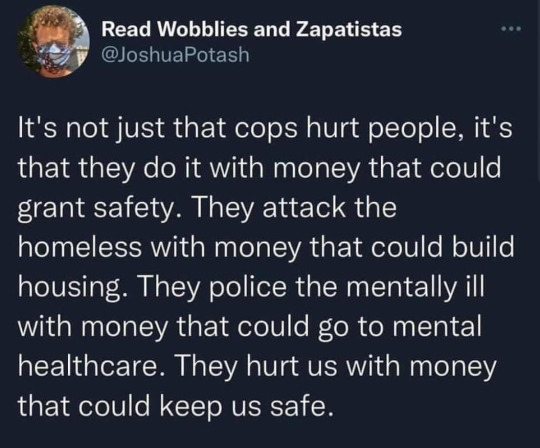
#corrupt cops#police state#police officer#arrest#police brutality#prison#queer#lgbtqia#lgbtq#mental wellbeing#mentality#therapy#problems#mental heath support#the mentalist#actually mentally ill#mentalheathawareness#mental health#struggle#stress
5K notes
·
View notes
Text
Snoopy was a lesbian and escaped a maximum security Chinese prison to be with his wife
947 notes
·
View notes
Text
We ask your questions so you don’t have to! Submit your questions to have them posted anonymously as polls.
#polls#incognito polls#anonymous#tumblr polls#tumblr users#questions#polls about ethics#submitted nov 27#prison#ethics#morality#society#ideology#crime
958 notes
·
View notes
Text

#convict#prisoner#locked up#jail#prison#inmate#prison cell#behind bars#prison uniform#handcuffed inmate
23 notes
·
View notes
Text
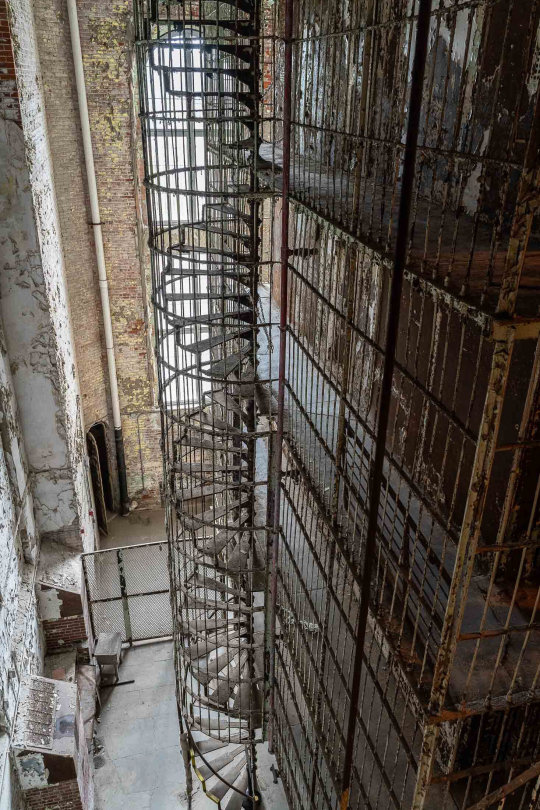

The former Ohio State Reformatory in Mansfield, Ohio, shot by Kevin Lush
1K notes
·
View notes
Text
679 notes
·
View notes
Text
things you should know about books and incarceration
I recently started working with a program that sends books to incarcerated people upon request. There are programs like this in many places throughout the US, under names like “Prison Books Project” or “Books to Prisoners.” Here’s some things you should know:
The most requested book, by far, is the English dictionary. The Spanish dictionary is also highly requested, as are GED prep materials, thesauruses, almanacs, and other reference books. If you have anything like that laying around unused, please consider donating.
Prisons are legally required to maintain libraries of legal resources (this falls under one’s right to counsel), but otherwise generally do not fund or maintain libraries, even for basic educational materials. The law libraries are also often filled with irrelevant law texts (e.g. real estate and civil procedures) instead of what prisoners actually need information about: appeals, civil rights, etc.
There are strict requirements on what books can and cannot be received, which vary from prison to prison and even depending on which staff member is processing the shipments. There are a thousand different reasons prison staff can pull a book from a shipment. Individuals, unfamiliar with the complex restrictions, are often unsuccessful at sending books to incarcerated loved ones.
Prison staff often don’t like prison book programs, despite the fact that they reduce recidivism and keep prisoners occupied and out of trouble. Why? Because it makes more work for them in the mail room. Yes, really.
Immigrants are the fastest growing prison population, so we get lots of requests for books in Spanish or English learning materials. Unfortunately, these are less frequently donated, so our selection is slim.
We also get requests for books about sign language, usually from people with Deaf cellmates who have no other way to communicate.
Books about starting businesses, trades, and reintroduction are extremely common from those planning their lives after release. It’s extremely difficult for convicted felons to find work after release.
We also get many requests about psychology or self-help books. A large percentage of our incarcerated population suffer from some mental illness or have loved ones who do.
Many prisoners were not properly supported in their education. We receive letters from low-literacy people who have severe learning disabilities, whose letters are difficult to read because they never learned to write properly. Comic books/manga are common requests from low-literacy people because they can look at the pictures.
Prison book programs are usually not well funded and must ration how often incarcerated people can write us and how often they can request certain types of high-demand books. Volunteers frequently find there are no suitable books to fill a request and buy books with their own money to make sure someone gets what they’ve asked for. Cash donations to prison book programs will go to buying high-demand books such as dictionaries, GED prep, and other basic education texts.
See if you have a program like this in your area, and consider volunteering or donating books or money. There are over 2 million people incarcerated in the US, and giving them access to books is the very least we can do.
16K notes
·
View notes
